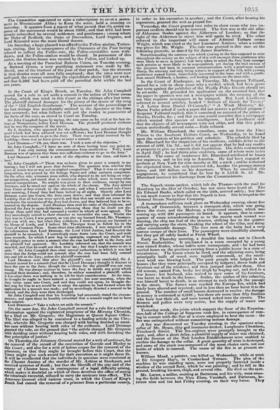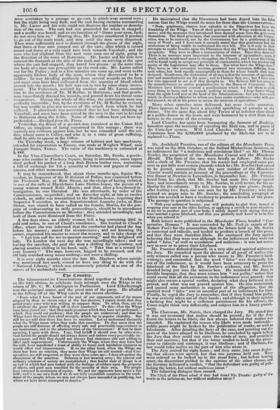The Superb steam-packet, which left the Thames with the mail
for Hamburg on the 21st of October, has not since been heard of. The Sir Edward Banks, which sailed on the 24th, arrived safely ; but there is too much reason to fear that the Superb is lost. She belonged to the General Steam Navigation Company.
A tremendous collision took place on Wednesday evening, about five o'clock, off Greenwich, between a transport-ship, which was going down the river, and the Medway, a Gravesend steamer, which was coming up, with 200 passengers on board. It appears, that in conse- quence of some misunderstanding as to the course each vesssel was steering, the ship ran foul of the steamer, striking her in the quarter and carrying away the stern, breaking the wheel of the tiller, and doing other considerable damage. The two men at the helm had a very narrow escape of their lives. The passengers were dreadfully alarmed, but they got all safely landed at Fresh Wharf.
Early on Thursday morning, a dreadful fire broke out in Church Street, Rotherhithe. It oriOnated in a room occupied by a young man named Scales, whose habits were intemperate, and '.ho had beers carried home on the previous evening from a public-house in a state of intoxication. The house where he lived, and the adjoining ones, being principally built of wood, were rapidly consumed, as the south- west wind was blowing hard. The poor people who lodged in the houses (for they were principally occupied by lodgers), threw beds and furniture out of the windows, and then jumped out after them. One old woman, named FOX, broke her thigh by leaping out, and died in a few hours: her husband, who waited to save some of his furniture, was burnt to death in the house. Scales, the author of this calamity, was himself burnt to death, in an attempt to rush through the passage to the street. The flames soon reached the Europa Inn, which had lately been altered and repaired ; and in less than an hour burnt it to the ground. The number of small houses destroyed is twelve: the damage in money is estimated at 6,0001.; but there are more than fifty families who have lost their all, and were turned naked into the streets. The firemen and police were very active, but the supply of water was wretched.
Yesterday week, the joists which support the floor of the Examina- tion-hall of the College of Surgeons took fire, in consequence of com- ing in contact with the flue of a stove employed to heat the room : the fire was extinguished without committing serious damage. A fire was discovered on Tuesday evening, in the spacious wine cellar of Mr. Byass, ship find insurance-broker, Langbourn Chambers, Fenchurch Street. The fire-engines were promptly brought to the spot; and, after a short delay, a plentiful supply of water was obtained, and the firemen of the New London Establishment were enabled to confine the damage to the cellar. A great quantity of wine is destroyed, and some of the stock was composed of the most choice sorts, not one bottle of which is insured. The cause of the fire is at present un- known.
William Mead, a painter, was killed on Wednesday, while at work at Sir Gregory Hay's, in Cumberland Terrace. The pins of the
machine he was standing upon, were not properly fastened inside a window of the second floor, which he was painting; and he fell to the ground, breaking his arm, thigh, and several ribs. He died on the spot.
Mr. Larter, a miller, residing at Battersea; and his wife, were cross- ing the fields between the Nine Elms, Vauxhall, and Battersea, be- tween nine and ten last Friday evening, on their way home. They were overtaken by a passage or go-cart, in which weze several men ; but the night being very dark, and the cart having etutains surrounding it, Mr. Larter and his wife could not discover the number or descrip- tion of the men. The cart bad not proceeded far when it stopped; and a scuffle was heard, and an exclamation of "Damn your eyes, Jack, do not serve him so." Hearing this, Mr. Larter considered it prudent to go out of the main track, and stop until the men were dispersed. They were sufficiently near to discern through the gloom of the night, that three or four men jumped out of the cart; after which it turned round and drove at a very rapid rate back towards Vauxhall ; and the men who had alighted from the cart were soon out of sight, going in the direction of the town of Battersea. Mr. Larter and his wife now entered the footpath at the side of the road, and on arriving at the spot where the cart had stopped, they heard low groans : at the same time the body of a man was perceptible on the road-side. Mr. Larter called out for the Police ; and in a few minutes one came up, and went to the apparently lifeless body of the man, whom they discovered to be a soldier : be was bleeding profusely from several wounds on the face, and must soon have been suffocated from the quantity of blood which passed into the mouth ; his belt was cut in two by some sharp instru- ment. The Policeman, assisted by another and Mr. Larter, carried him to the residence of Dr. McKellar, in Battersea ; and that gentle- man immediately dressed his wounds, and poured down his throat some restoratives. During the whole of this time, the unfortunate man was perfectly insensible ; but, by the exertions of Dr. McKellar be revived, but was unable to give any account of the attack from which be had suffered. It afterwards was ascertained that he had been drinking at Vauxhall, and must have been seized by the men in the cart in his road to Battersea along the fields. None of the ruffians have yet been ap- prebended.—Abridgedfrom the Times.
Yesterday, the driver of a go-cart was examined at the Union Hall Office, on suspicion of being concerned in this outrage ; there was scarcely any evidence against him, but he was remanded until the sol- dier, whose name is Culley, and who is in a state of great suffering, shall be able to appear at the Office.
On Thursday week, a large seizure of bobinet and lace machinery, intended for exportation to France, was made at Wright's Wharf, near Irongate Stairs, Tower. The value of the machinery is estimated at 5, VOL
In the Vice-Chancellor's Court, on Saturday, Mr. Steele, a gentle- man who resides in Finsbury Square, being in attendance, some expert thief picked his pocket of a long drab Russia leather case, containing a bill of exchange for 751. a quantity of letters and papers of conse- quence, and other memoranda.
It may be remembered, that about three months ago, Squire Wo- Tendon, an Inspector of the D division of Police, was examined before Sir Frederick Roe, at Bow Street, on the charge of having violated, in one of the cells at Marylebone Lane Station-house, the person of a young woman named Ruth Morris ; and that, after a Icnsthened in vestigation, he was liberated. He was afterwards, by order of the Commissioners, suspended ; and on Saturday night, as late as twelve o'clock, an order was transmitted to the Station-house, requiring that Inspector Vi ovendon, as also Superintendent Lazenby (who, at Bow Street, was stated to have called on the female, Morris, for the pur- pose of endeavouring to stifle proceedings), should be in attendance before the Commissioners on Monday : they attended accordingly, and both of them were dismissed from the Force.
A few days since, an eldetly woman left a bag containing 260/. in gold and notes, in one of Cloud's omnibuses. She hurried to Cloud's office, where she was informed that the conductor had placed the bag before his master ; stated the circumstance ; and not knowing the owner, requested his master to count the money, and to take charge of it. " Let him call for me to-morrow morning," said the delighted old lady. To London the next day she was accordingly taken ; and on leaving the omnibus, she paid the man a shilling for the journey, and placing another shilling in his hand, said, " Take that as a reward for your honesty !" The man, however, begged to be excused, and the old lady marched away minus nothing—not even a shilling. It is now eight months since the late Mr. Mayhew, whose suicide was mentioned last week, ceased to have any thing to do with the "National Library," which was erroneously pointed at as one of the causes of his melancholy end.



















 Previous page
Previous page